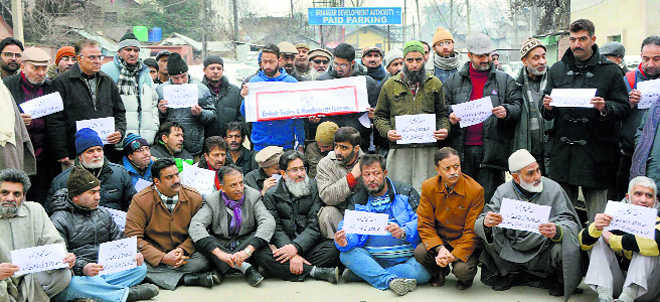Centre goes pragmatic on Art 35-A
Arun Joshi
THE Centre has made an unexpected but pleasant and pragmatic assertion that it has no plans to abolish Article 35-A and Article 370 of the Indian Constitution "as of now."
These provisions, conferring special status to Jammu and Kashmir and exclusive privileges and rights to its residents, have become an article of faith for Kashmiri Muslims. They deem these provisions as a protective shield against a systematic threat to their political and religious identities. Their fears have grown, at least they articulate in that fashion, since the BJP under Narendra Modi came to power. Kashmiri Muslims have an inherent fascination in viewing themselves as special and separate from the other countrymen.
Frankly, they prioritise their nationalist identity; an identity that has now been consumed by their passion for the dominance of their Islamic identity and it gives to them unique satisfaction when they describe themselves as non-Indians.
The statement of Minister of State for Home Hansraj Ahir in the Parliament can prove helpful in enabling the regional ruling party, the PDP, particularly Chief Minister Mehbooba Mufti, inform other Kashmir-centric parties that the Centre could be trusted even on the most sensitive matters. She could argue that her ally, the BJP, has risen above its ideological and partisan party considerations to walk the talk on the special status of the state.
Politically, the BJP is wedded to the cause of the abolition of these provisions — Article 370 grants special status to J&K with its own constitution, flag and where no central laws can be extended without the prior approval of the state legislature. Article 35-A defines special privileges for the permanent residents of the state, including jobs, acquisition of immovable assets and citizenship rights.
The BJP has conceded to this clause in unmistakable terms. This reaffirms PDP's faith in the Central leadership, besides allaying fears generated by the Opposition and separatists who had threatened to set Kashmir aflame if the special provisions were tampered with. Some of these parties and leaders, like the National Conference of the Abdullahs and separatists Syed Ali Shah Geelani, Mirwaiz Umar Farooq accuse the Hindutva forces and the Centre of seeking to change the Muslim-majority character of the state. This ploy is often used to draw international attention to the accusation that Delhi is submerging their Islamic identity.
The fears had arisen with regard to Article 35-A because of a PIL filed by an RSS affiliate. And, since the Centre did not file any affidavit in the Supreme Court on the issue, apprehensions found a fertile ground to grow. Kashmiri parties made it look like a matter of life and death. A vendor was roughed up for he had dared to come out with his banana-laden cart on the day of the general strike called by separatists to protest the alleged attempts to do away with Article 35-A. He wanted to know the reason. The mob shouted down him with a chorus "Article 35-A." This kind of frenzy is commonplace in Kashmir. But, for the time being this frenzy is expected to find a resting place; for the government of India cannot take a different stand in the Supreme Court from what it stated in the Parliament on Wednesday.
Many were intrigued, and rightly so, when on October 30, Attorney-General KK Venugopal told the Supreme Court that the hearing on Article 35-A be deferred by six months because the Centre had appointed a special representative — Dineshwar Sharma — to hold a dialogue in J&K. The connection between the appointment of interlocutor and the hearing on Article 35-A was baffling to many. The pieces fell in place on Wednesday when the Centre made its stand clear. This should help enhance the credibility of the government and its dialogue process.
There, however, is a sore point. J&K's minorities complain of injustice and absence of redress of their grievances because of the special status. They have been denied benefits while the Muslims in the state get those benefits as a national minority. With this stand of the Government of India, fear and scare among the minorities are bound to grow. Their silent migration — which is a delight to the Islamic radicals— is bound to accelerate. The Kashmir-centric parties have a role to make minorities partners to the benefits that they claim for the majority community.
The minorities do not have a commission on the technical ground that this is not the case in any other state where national minority is in a majority. The Centre also has a responsibility to ensure that the minorities find a conducive atmosphere to live with dignity. Its next steps would be under watch. For the moment, it has done a favour to itself by dousing the shouldering sentiments in Kashmir on the issue of the special provisions.
The Agenda of PDP-BJP Alliance
The Agenda of Alliance — the governance document of the PDP-BJP — mentions clearly that “while recognising the different positions and appreciating the perceptions BJP and PDP have on the constitutional status of J&K, considering the political and legislative realities, the present position would be maintained on all the constitutional provisions pertaining to J&K, including the special status in the Constitution of India.”
ajoshi57@gmail.com
Unlock Exclusive Insights with The Tribune Premium
Take your experience further with Premium access.
Thought-provoking Opinions, Expert Analysis, In-depth Insights and other Member Only Benefits
Already a Member? Sign In Now










